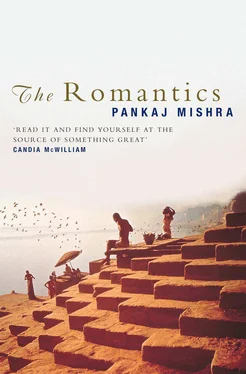First, one of the performers who had come with Anand — an old courtesan who had quietly spent most of the evening in one corner of the roof — sang a Thumri. It was about Radha’s love for Krishna, the longing that remains for ever unfulfilled, and shades into a bitter-sweet acceptance of life and its limits; and it was sung well, with a depth of feeling that would have been impossible to predict from the appearance of the singer, who was about seventy years old, with eyes kohl-rimmed a forbidding black. Mark, who sat in front of me, obscuring my view of Sarah, kept shaking his head and throwing up his hands in the appreciative manner he seemed to have picked up from Indian audiences. Debbie sat cross-legged and stiff in a meditative posture, her eyes closed. Miss West, her face visible to me in profile, wore that melancholy expression she often had when she sat on the roof looking out over the river.
Then it was Anand’s turn, and he played Raga Malkuns, one of the gravest of Indian ragas, a look of tense concentration on his face, fingers sliding up and down the strings with a vehemence that was in sharp contrast to the sombre stately notes produced by his instrument. Catherine accompanied him on the tanpura. ‘They are very much in love,’ Miss West had said, and I played with the words in my head, trying to fit them to what I saw before me. But Catherine and Anand barely glanced at each other; it wasn’t easy to imagine between them the continuous exchange of tenderness and passion that the words ‘very much in love’ suggested. So dissimilar they appeared: Anand, fidgety and intense, who, with his thin face and tormented looks, would always be associated with the warren of dark slumbering alleys around us; and Catherine, looking in her calm self-possession, as she would always do, from another world, richer and more fulfilled than the one she lived in now.
In the months that followed this evening, I was to see her in every mood and posture, in every kind of dress and at different times of the day; such rapt gazing as mine would leave a wealth of memorable images in my mind. But it is the picture of her sitting up very straight on the jute mat, abstractedly plucking at the tanpura’s strings, the light from the short flickering flame of the diyas bathing her clear unblemished face in a golden glow, that has stayed most vividly with me, and is the central force that illuminates the rest of the evening in my memory.
IT DIDN’T TAKE LONG for my days in Benares to fall into the kind of self-imposed routine I had known during my undergraduate years in Allahabad. I got up early, awakened, more often than not, by the sounds from nearby houses: radios blaring devotional music, crying babies, wet laundry being slapped against the bathroom floor, the voices of people queuing up before the municipal tap in the alley below, water cannonading into plastic buckets.
Within an hour I was ready to leave. The door to Miss West’s room was still closed when I went down the stairs to have breakfast with Mrs Pandey and Shyam. I sat on a low wooden stool in their lightless kitchen and ate warm parathas off a brass plate and drank ginger-flavoured tea from a scalding-hot steel glass. Shyam squatted before the chulha fire, fanning the flames with a sooty jute fan. Mrs Pandey sat before me, slowly slicing vegetables in a large brass plate, her broad face expressionless as always.
I walked the three miles to the library — my meagre budget couldn’t accommodate rickshaw rides to and from the university every day.
A thin crimson-edged mist hung over the river when I walked out of the house. The alleys leading to the main road would be empty, the houses sunk in a blue haze, still untouched by the sun, which had already begun tentatively to probe the façades of the houses lining the river. Rubbish lay in uneven mounds, or was strewn across the cobblestone floor, firmly sticking to the place where it had been deposited by an overflowing open drain. After every twenty metres or so, a fresh stench hung in the air.
The road was full of potholes, which, when filled by unseasonal downpours, reflected the tops of the overlooking houses and a slice of the sky in their dirty grey stillness. There was little traffic, except for a few newspaper boys on cycles, who would jauntily pedal past the slow-moving rickshaws bulging with noisy schoolchildren, satchels and plastic water bottles; swift sprightly figures, in contrast to the rickshaw drivers, silently toiling with their heavy loads, bare feet and legs thrusting at the obdurate pedal, their shoulders pushed back and arms stretched taut over the handles.
After the constriction of Lanka — box-shaped brick houses, shuttered shops, exposed drains, pavement vegetable vendors and tea shops spilling out over the road — there would be the ever-renewed surprise of the university’s green open spaces; the broad tree-lined avenues stretching from one end of the campus to the other; the sprawling cricket and hockey grounds; the quiet cool groves of bamboo, banyan and mango trees.
*
The person I knew best in this other life I came to lead on the university campus — separate from the life I led in Panditji’s house, with Miss West as neighbour — was Rajesh. His name was given to me by someone I knew in Allahabad, a man called Vijay. Vijay, once a secretary of the student union, had left Allahabad University almost middle-aged, after accumulating, in the manner of student politicians, six degrees in literature, commerce, journalism and law. He was now a ‘contractor’ — the much-used multipurpose word that could denote anything from a supplier of building materials to an organizer of arson and even murder. Almost all of the student politicians and troublemakers called themselves ‘contractors’; the word was considered more weighty than ‘businessman’.
But Vijay was a Brahmin, and he felt he must affect a certain aloofness from the common run of ‘contractors’. He had made his name after organizing a large demonstration against the then prime minister, Indira Gandhi, when she visited the university a few years before she was assassinated. The demonstration turned violent when the police attempted to break it up, and the police were especially brutal with Vijay. In hospital with fractured arms and legs and multiple stitches on his skull, Vijay received visits from national-level politicians from parties opposed to Indira Gandhi, and briefly became famous.
Too old now to play an active part in student politics, he nevertheless displayed an elder-brotherly solicitude towards the Brahmin students at the university. He lobbied hard with the administration on their behalf to postpone exams, or to reinstate an expelled student; he worked overtime on the labyrinthine university bureaucracy to get more Brahmin students admitted into university hostels. He asked for nothing in return from those he favoured other than their votes for Brahmin candidates in elections to the student union. That was how he came to know me: he volunteered to help me gain a health certificate from the university infirmary, and I turned into one of the young Brahmin students under his protective umbrella. ‘Studious’ Brahmins like myself, he would say, pronouncing the English words with relish, needed ‘backers’ if they were to go on studying without fear of disturbance from low-caste ‘lumpens’ and ‘antisocial elements’.
He had probably seen himself extending his patronage to Benares when he gave me Rajesh’s name, and asked me to look him up at the Hindu University.
I said I would, but I had little intention of doing so. In truth, I was made uncomfortable by Vijay. I had no sympathy for sectarian, caste- or religion-based politics; I wanted to keep as far away as possible from the constant skulduggery and intrigue that went on among different political factions, and that frequently resulted in violence.
Читать дальше












